|
De Engelse dichter John Hegley werd geboren op 1 oktober 1953 in Londen. Zie ook mijn blog van 1 oktober 2008 en ook mijn blog van 1 oktober 2009.xml:namespace prefix = o ns = "urn:schemas-microsoft-com:office:office" />
The Death of a Scoutmaster
How I remember the old scoutmaster
nobody could start a camp-fire faster
I can see the old scoutmaster in the old scout hut
saying always carry a plaster
in case you cut yourself
if it doesn't happen to you it could happen to your
dog
you could be chopping up the firewood
when you mistake him for a log
if it doesn't happen to your dog
it could happen to your glasses
they could be knocked to the floor
by the long arm of the law
when you're standing on the corner
and a copper on a push-bike signalling a left turn
passes by
if it's a friend you need you need a friend indeed
you need a plaster
you need your money and your keys
but more than these you need a plaster
always carry a plaster the scoutmaster told us
they found one in his pocket
the day a bus ran over him.
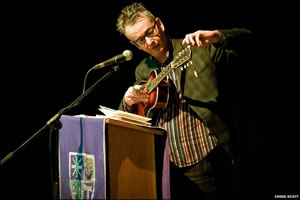
John Hegley (Londen, 1 oktober 1953)
De Amerikaanse schrijver Tim O'Brien werd geboren op 1 oktober 1946 in Austin, Minnesota. Hoewel O'Brien in de jaren zestig tegen de oorlog in Vietnam, ging hij toch het leger in om tegen de communisten te vechten in het Aziatische land. Het vooruitzicht dienst te weigeren en naar Canada te 'vluchten' vond hij nog erger, zo schrijft hij in zijn memoires. Terug in Amerika ging hij aan Harvard University studeren. Tijdens de vakantiemaanden werkte hij als journalist voor de Washington Post.
In 1973 debuteerde hij met zijn memoires 'If I Die in a Combat Zone, Box Me Up and Send Me Home'. In 1978 won hij de National Book Award met 'Going after Cacciato'.
Uit: The Vietnam in Me
In February 1969, 25 years ago, I arrived as a young, terrified pfc. on this lonely little hill in Quang Ngai Province. Back then, the place seemed huge and imposing and permanent. A forward firebase for the Fifth Battalion of the 46th Infantry, 198th Infantry Brigade, LZ Gator was home to 700 or 800 American soldiers, mostly grunts. I remember a tar helipad, a mess hall, a medical station, mortar and artillery emplacements, two volleyball courts, numerous barracks and offices and supply depots and machine shops and entertainment clubs. Gator was our castle. Not safe, exactly, but far preferable to the bush. No land mines here. No paddies bubbling with machine-gun fire.
Maybe once a month, for three or four days at a time, Alpha Company would return to Gator for stand-down, where we took our comforts behind a perimeter of bunkers and concertina wire. There were hot showers and hot meals, ice chests packed with beer, glossy pinup girls, big, black Sony tape decks booming "We gotta get out of this place" at decibels for the deaf. Thirty or 40 acres of almost-America. With a little weed and a lot of beer, we would spend the days of stand-down in flat-out celebration, purely alive, taking pleasure in our own biology, kidneys and livers and lungs and legs, all in their proper alignments. We could breathe here. We could feel our fists uncurl, the pressures approaching normal. The real war, it seemed, was in another solar system. By day, we'd fill sandbags or pull bunker guard. In the evenings, there were outdoor movies and sometimes live floor shows -- pretty Korean girls breaking our hearts in their spangled miniskirts and high leather boots -- then afterward we'd troop back to the Alpha barracks for some letter writing or boozing or just a good night's sleep.
So much to remember. The time we filled a nasty lieutenant's canteen with mosquito repellent; the sounds of choppers and artillery fire; the slow dread that began building as word spread that in a day or two we'd be heading back to the bush. Pinkville, maybe. The Batangan Peninsula. Spooky, evil places where the land itself could kill you.
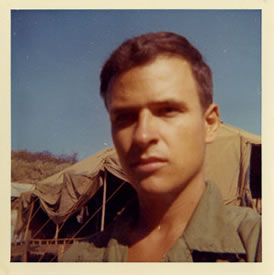
Tim O'Brien (Austin, 1 oktober 1946)
Als militair
De Amerikaanse dichter en bloemlezer Louis Untermeyer werd geboren op 1 oktober 1885 in New York City. Na een korte opleiding begon Untermeyer zonder diploma in het bedrijf van zijn vader, waar hij bleef tot 1923, op het laatst als vice-president. Hij wijdde zich daarna aan zijn carrière als schrijver. Zijn eerste gedichtenbundel, First Love verscheen 1911. Untermeyer publiceerde meer dan 100 boeken, waaronder zijn zeer invloedrijke bloemlezingen van de Amerikaanse en Britse poëzie, maar ook kinderboeken, parodieën, en biografieën. Als vertaler bracht hij o.a. Heinrich Heine en Gottfried Keller onder de aandacht van zijn landgenoten. Hij was betrokken bij de oprichting van The Seven Arts, een tijdschrift dat een belangrijk forum was voor jonge dichters, onder wie Robert Frost. IMet Frost verbond Untermeyer een lange vriendschap. In 1956 kreeg hij van de Poetry Society of America de gouden medaille. Hij was ook een Poet Laureate Consultant in Poetry van de Library of Congress van 1961 tot 1963. Untermeyer was vóór de Eerste Wereldoorlog betrokken bij de uitgave van het marxistische tijdschrift The Masses. Net als veel van zijn kameraden, keerde hij zich tegen deelname van Amerika aan de oorlog.
Faith
What are we bound for? Whats the yield
Of all this energy and waste?
Why do we spend ourselves and build
With such an empty haste?
Wherefore the bravery we boast?
How can we spend one laughing breath
When at the end all things are lost
In ignorance and death? . . .
The stars have found a blazing course
In a vast curve that cuts through space;
Enough for us to feel that force
Swinging us through the days.
Enough that we have strength to sing
And fight and somehow scorn the grave;
That Lifes too bold and bright a thing
To question or to save.
Feuerzauber
I never knew the earth had so much gold --
The fields run over with it, and this hill,
Hoary and old,
Is young with buoyant blooms that flame and thrill.
Such golden fires, such yellow -- lo, how good
This spendthrift world, and what a lavish God --
This fringe of wood,
Blazing with buttercup and goldenrod.
You too, beloved, are changed. Again I see
Your face grow mystical, as on that night
You turned to me,
And all the trembling world -- and you -- were white.
Aye, you are touched; your singing lips grow dumb;
The fields absorb you, color you entire . . .
And you become
A goddess standing in a world of fire!
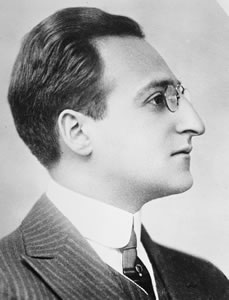
Louis Untermeyer (1 oktober 1885 - 18 december 1977)
De Oostenrijkse schrijfster Inge Merkel werd geboren op 1 oktober 1922 in Wenen. Zie ook mijn blog van 1 oktober 2008 en ook mijn blog van 1 oktober 2009.
Uit: Der rote Rock
Ein Leser, der bis zuletzt durchhalten und nicht am Ende dieses verstrickte Gewirr von Mitteilungen und Textfragmenten zornig vom Tisch gewischt oder jedenfalls resignierend still zur Seite gelegt haben will, sollte erfahren, wer hier berichtet und wer mal sie ist und mal ich ist und letztendlich was für einer ICH ist.
Nicht dumme Heimlichtuerei veranlasst mich, dem neugierigen und verständnisbereiten Leser die ganze Wirrsal unaufgelöst und unerklärt vor die witternde Nase zu setzen. Ich bin selbst etwas ratlos und sehe mich in diesem Wort- und Satzgeröll von beiden Beinen gerissen und abgestürzt. Aber ich will nun endlich vernünftig anfangen und die Lage zu erklären versuchen.
Sie und ich ist, wie man im Roman sagt, die Hauptperson, um die herum und aus der heraus alles aufgeschrieben wurde. Genau genommen eine achtzigjährige Frau auf der Endstrecke ihres Lebens. Ja, auf der Endstrecke. Manche Leser mögen denken: was interessiert mich der sterile Rest eines Lebens, wo nichts Wissenswertes mehr geschieht, wo auf jeden Schritt und jeden Atemzug bereits der Schatten des Todes fällt, mit Furcht oder ohne oder mit nur fallweiser Furcht.
Schwieriger ist zu erklären, wer ICH bin. Denn unsere, das heißt meine Existenz ist nicht allgemein bekannt, obwohl jeder lebende Mensch ungeachtet besonderer Merkmale wie Geschlecht, sozialer Stand und Sprache einen wie mich hat, genau gesagt, mit mir zusammen geboren wurde, mich aber nicht sehen oder spüren kann, mich bestenfalls manchmal ahnt. ICH bin ein Comes, eine Wesensgattung, die bei der Schöpfung nicht eingeplant war, sondern aus bestimmten Gründen als Nachtrag und Korrektur ins Leben gerufen wurde, von Gott, der bei eingehender Betrachtung seiner Lieblingsschöpfung, des Menschen, zu zweifeln begann und in Ratlosigkeit fiel. Er hatte sich dieses Wesen zwischen Gott und Tier mit Liebe und großer Erwartung ausgeformt: Lehm, angehaucht mit seinem Atem, wie man es sich vorstellt und erzählt und geschrieben hat. Gedacht als ein Geschöpf zu seiner, Gottes, Unterhaltung, denn das Leben der Natur, einschließlich der organischen, läuft ja sehr einförmig ab und langweilte bald durch seine angeschaffene Gleichförmigkeit.
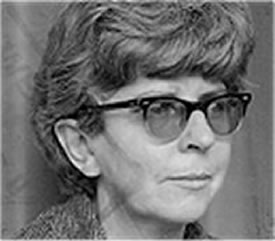
Inge Merkel (1 oktober 1922 15 januari 2006)
De Russische schrijver Sergej Aksakov werd geboren op 1 oktober 1791 in Oefa. Zie ook mijn blog van 1 oktober 2008..
Uit: Years of Childhood (Vertaald door J. D. Duff)
Once in the early morning I woke, or became conscious, and could not recognize where I was. All was unfamiliar: the large lofty room, the bare walls of fir planks, new and very thick, the strong smell of resin. The sun a summer sun, apparently was just rising, and, as it shone through a window on my right above a thin canopy spread over me, was brightly reflected on the opposite wall. Near me was my mother sleeping uneasily, in her clothes and with no pillows. Even now I seem to see her black hair straying in disorder over her pale thin face.
(...)
I was very fond of the smell of resin, which was sometimes used to fumigate our nursery. I smelt the sweet transparent blobs of resin, admired them and played with them; they melted in my hands and made my long thin fingers sticky; then my mother washed and dried my hands, and I began to doze. Visible objects became confused before me: I thought that we were driving, and that I refused to take some medicine which was offered me, and that the figure beside me was not my mother, but my nurse Agatha or my foster-mother
How I went to sleep, and what happened afterwards, I have quite forgotten.
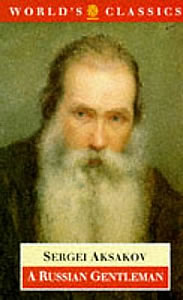
Sergej Aksakov (1 oktober 1791 - 12 mei 1859)
|



